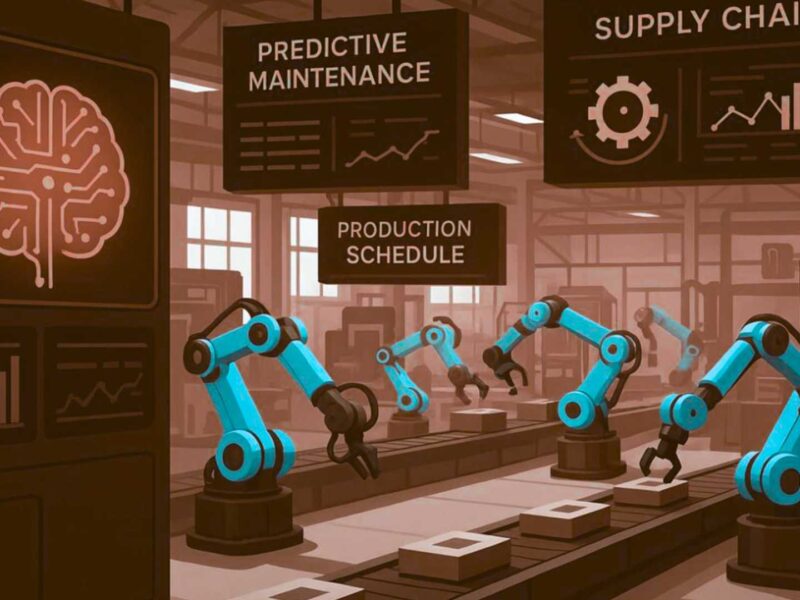AI for Social Good: How Leaders Plan to Accelerate and Direct Impact
The conversation around AI is stuck in a loop, oscillating between its power to generate wealth and its potential to cause societal harm.
But this debate misses the technology’s most crucial test: its ability to do good.
While we focus on optimizing profits, AI holds the potential to tackle humanity’s greatest challenges, from discovering new medicines to fighting climate change.
The problem isn’t a lack of technical power, but a lack of focused will.
To find a clear path forward, we asked tech leaders, business visionaries, and policy experts for their single most important strategy to accelerate AI for social good.
The question was clear:
In your opinion, what’s one way to accelerate the use of AI for social good, ensuring it addresses pressing societal needs? Share your insights on strategies, partnerships, or technologies that can drive AI’s impact for a better future.
Their answers provide a practical playbook for turning potential into progress.
Read on!
Valentin Radu
Promoting open-source tools and adopting clear systems are essential steps for building trust, driving progress, and encouraging teamwork in technology development. Open-source tools give programmers, scientists, and businesses the ability to improve on existing ideas, speeding up growth and cutting down on duplication.
Clear systems promote responsibility and help avoid unfairness by exposing how decisions are made. Professionally, these methods support ethical practices and ensure fair access to technology, allowing a range of perspectives to play a role.
By embracing these values, we can design inclusive solutions that serve society while addressing worries about justice and dependability. Openness and teamwork also boost public trust, creating opportunities for technology to improve fields like medicine, learning, and protecting the environment.
Valentin Radu
Founder, Omniconvert
Raju Dandigam
The acceleration of AI for social good requires grassroots nonprofits to partner with tech professionals who convert real-world problems into functional AI solutions. The development of AI systems usually occurs in isolated environments, which keeps them distant from the communities they aim to benefit. Engineers, researchers, and designers achieve better results when they work together with social workers, public health teams, and educators to develop practical tools.
The volunteer-led education project I supported used basic AI models to forecast student dropout risks through attendance and engagement data, which enabled mentors to intervene early. The model lacked complexity yet produced tangible results because it addressed the community’s everyday requirements.
The essential factor is not additional AI systems but AI solutions that matter to people, which require extensive teamwork and trust between developers and users. This approach makes the transition from proof-of-concept to real-world change possible.

Raju Dandigam
Engineering Manager, Navan
Eunice Arauz
One of the most effective ways to drive AI for social good is to apply it within local communities, tackling issues that directly affect people’s everyday lives.
As the owner of a business, I’ve seen firsthand how technology, especially AI, can be used to solve problems that otherwise might have been overlooked.
For example, in my experience, AI can be utilized in logistics and inventory management to ensure that products reach communities in need, especially in rural areas or underserved populations.
Using AI to predict demand and optimize delivery routes could have a significant impact on improving access to essentials, saving both time and money.
AI can also be applied to improve communication between organizations and the communities they serve.
Platforms that use AI to analyze data from social media, surveys, or other forms of communication allow organizations to tailor their services more effectively.
This is where AI’s real potential lies – in using its data-driven capabilities to directly address the needs of the community, and that’s how I believe we can truly make a difference.
In my case, implementing AI in customer engagement strategies has allowed me to address needs more precisely and consistently, providing better service for everyone involved.

Eunice Arauz
Founder, Pets Avenue
David Hunt
One of the most effective ways to accelerate AI for social good is through strategic partnerships between tech companies and non-profit organizations. By combining resources, expertise, and data, we can address urgent societal needs more efficiently.
For example, at Versys Media, we’ve collaborated with initiatives that utilize AI for disaster response, where predictive analytics help mobilize resources faster in crisis situations.
The integration of AI technologies into existing frameworks can improve decision-making and increase operational efficiency, transforming the way we tackle complex issues like public health and environmental challenges.
Emphasizing transparency and ethical considerations in these partnerships ensures that AI solutions truly provide long-lasting benefits for society.
David Hunt
COO, Versys Media
Jared Bauman
To accelerate AI for social good, one key strategy is fostering cross-sector partnerships between tech companies, nonprofits, and governments.
By combining AI innovation with deep social expertise, we can create impactful solutions tailored to real-world problems, such as healthcare access, climate change, and education.
Additionally, leveraging AI to analyze and predict social trends can help target resources more effectively.
For example, AI-driven tools that predict natural disasters or analyze public health trends can save lives and prevent economic disruptions.
Collaboration is essential, as is building AI systems that prioritize inclusivity and fairness, ensuring these technologies benefit society at large, especially marginalized communities.

Jared Bauman
Co Founder & CEO, 201 Creative, LLC
James Lei
There needs to be a greater fostering of strong partnerships between tech developers, governments, and community organisations. Collaboration like this would ensure that AI solutions are grounded in real-world needs rather than theoretical possibilities.
Governments can provide data access and regulatory frameworks that encourage innovation while safeguarding privacy. Meanwhile, community groups could offer critical insights into local challenges and help shape AI applications that truly benefit those most affected.
On the technology side, prioritising open-source tools and transparent algorithms can speed up adoption and trust, especially in areas like healthcare, education, and environmental monitoring.
By combining practical partnerships with responsible tech development, AI can be steered towards meaningful, inclusive outcomes that address pressing societal problems effectively.
Ben Miller
To accelerate AI adoption in the social good sector, the focus should be on partnerships and tools that reduce effort, not add to it.
Nonprofits don’t lack interest in AI, they lack time and confidence in the tools.
The best technologies will bring value without requiring staff to become AI experts to clean up after the machine.
This only works when the AI is built by people who understand what the nonprofit is trying to do and give the model a structured, reliable way to execute those tasks.
If your AI needs you to finish the job, it’s not helping.
Look for tools where the agent does most of the heavy lifting. That’s when AI stops being a buzzword and starts being a force multiplier.

Ben Miller
VP, Data Science & Analytics, Bonterra
Dhaval Gajjar
To effectively accelerate the use of AI for social good, we need to establish collaborative ecosystems that connect governments, ethical AI developers, academic institutions, and mission-based organizations.
These collaborations ensure that AI is developed for both innovation and change—focused on immediate global challenges like healthcare accessibility in low-income regions, real-time disaster response, and equality in access to digital education.
A particularly valuable strategy is to invest in and publicize open-source AI initiatives. Open-source platforms facilitate democratized innovation, solicit a broad range of contributions from all sectors and parties, and scale transparent solutions more quickly.
It is equally important to establish rigorous ethical standards and data governance frameworks.
Sharing data in a responsible manner that is privacy-protected can unleash the full potential of AI without infringing on individuals’ rights.
By infusing fairness, accountability, and inclusive practices into every phase of the AI lifecycle, we can create an AI-driven future that benefits humanity.
Carla Niña Pornelos
A few years ago, we launched an initiative to spotlight underrepresented artists using algorithmic curation. Initially, the AI reinforced mainstream biases—but with the right partnerships, we trained it to uplift marginalized voices. That experience reshaped my belief in AI’s role for social good: it’s not just about what AI can do, but who gets to shape what it learns.
To accelerate AI for societal impact, we need more cross-sector collaboration between technologists, nonprofits, and cultural institutions. AI won’t naturally lean toward equity—it must be designed with diverse data, goals, and human values. Public-private partnerships are key: tech firms providing infrastructure, nonprofits guiding mission alignment, and community organizations ensuring relevance.
At Wardnasse, we’ve seen how even modest AI tools—like natural language classifiers for grant applications—can democratize access when built with empathy. The strategy? Involve the end users from day one. Co-design, not top-down implementation, creates AI that’s truly inclusive.
AI’s potential is enormous, but its direction depends on intention. To serve society, it must be shaped by those who know society best.

Carla Niña Pornelos
General Manager, Wardnasse
On behalf of the Techronicler community of readers, we thank these leaders and experts for taking the time to share valuable insights that stem from years of experience and in-depth expertise in their respective niches.
If you wish to showcase your experience and expertise, participate in industry-leading discussions, and add visibility and impact to your personal brand and business, get in touch with the Techronicler team to feature in our fast-growing publication.













